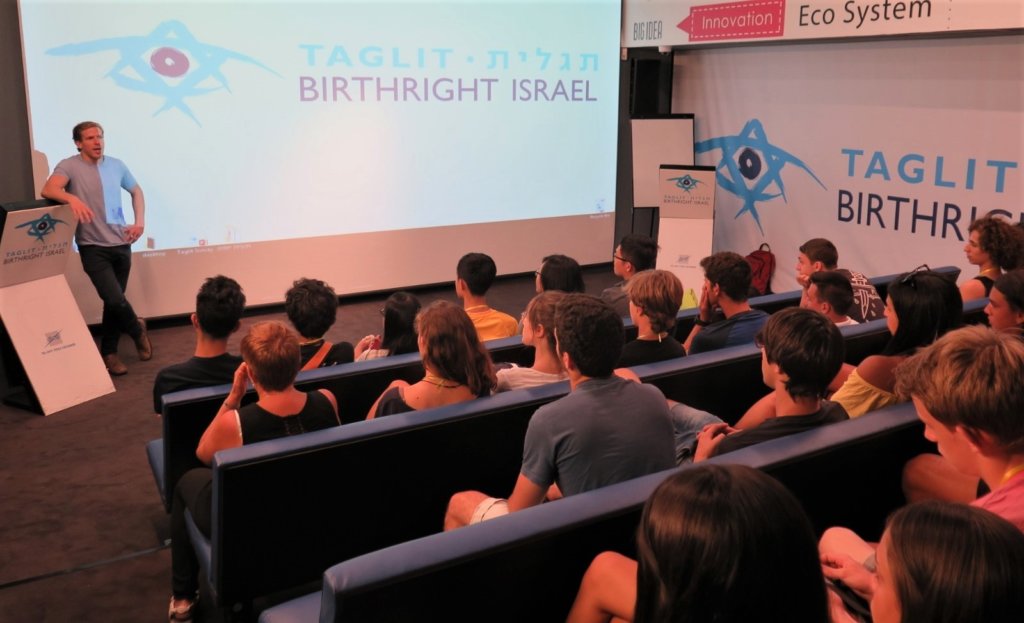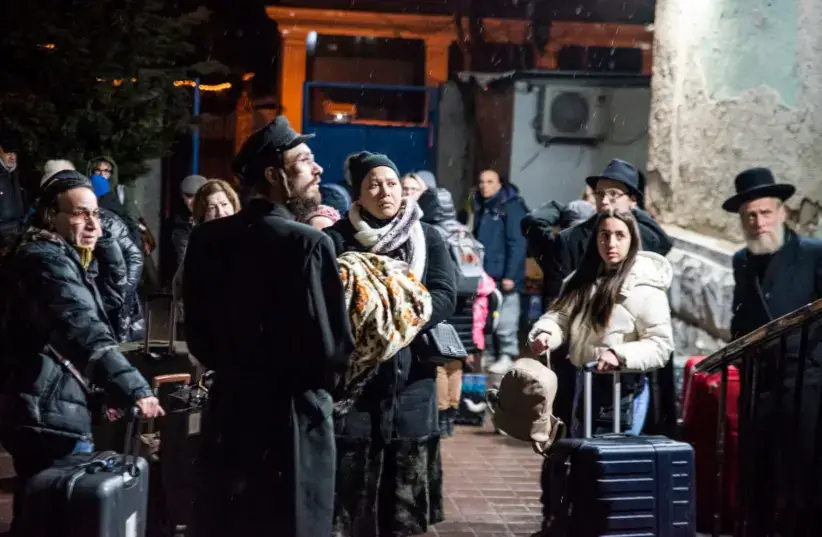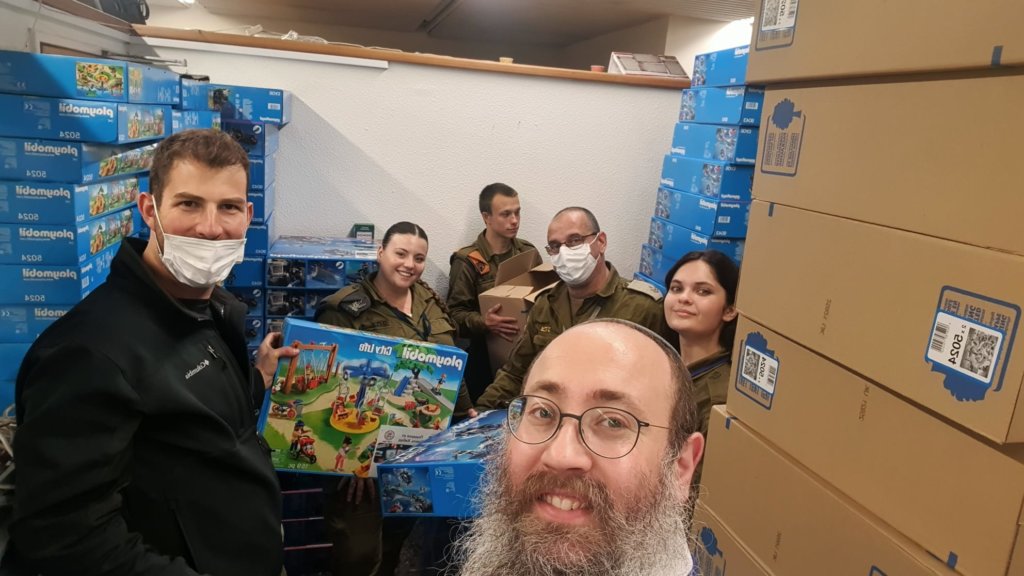Everyone jump into the pool! The high-tech talent one called Brightcode, that is
Original article published in the JNS
“I call on those who meet the requirements to come to Israel, gain top-tier training and become a part of our cutting-edge innovation ecosystem. We need your spirit and commitment,” said Israel Innovation Authority CEO Dror Bin.
When the rapidly expanding high-tech industry in Israel realized that it was facing a staffing shortage now and in the future, it did what it typically does: It got a little creative.
With the help of the Israel Innovation Authority, it turned to a ready, willing and able pool of 750,000 potential candidates—Birthright alumni living around the world.
Such intellect may prove to be a partial solution to the coding shortage in Israel, which is predicted to grow worse in the coming years. Brightcode, powered by Birthright Israel, is a soon-to-launch program offering eligible Jewish adults ages 18 to 32 a free, six-month, in-depth programming boot camp, followed by a two-year paid work experience in Israel with a high-tech company.
The boot camp, which kicks off on June 12 and runs through Nov. 23, consists of five months of learning on Zoom eight hours a day, five days a week. In the last month, participants are flown to Israel to study in a designated classroom at the Experis Academy offices in Tel Aviv.
Skills taught encompass practical, in-depth training in computer programming including Python, HTML, CSS, JAVASCRIPT and React. The 20 to 25 participants in the first cohort will be fully trained to work as Full Stack developers. While there is no stipend for the program itself, participants receive the training—valued at $15,000—at no cost.
Once hired by high-tech companies, starting monthly salaries are approximately $4,000. Registration opened on March 1 and ends on May 15.
Alumni of Taglit-Birthright Israel are given first priority, although all Jewish adults in the designated age bracket will be considered. Attendees take part in an Onward Israel program and are initially provided with housing in Tel Aviv. Once employed, participants will be responsible for locating and paying for their housing and other living expenses.
‘Continue the journey across various stages of life’
Renat Wegrzyn, head of Birthright Israel Digital, is excited about the new initiative and sees it as part of the “never-ending journey to offer ways to fulfill Birthright’s mission to strengthen Jewish identity.”
CEO of Birthright Israel Gidi Mark notes that given Birthright’s extremely large database, it is in a unique position to connect motivated young professionals to the Startup Nation. “As the largest educational tourism organization in the world, we understand that we have power—not only in strengthening Israel’s connection to Diaspora Jewry but in strengthening the high-tech industry.”
Israel and the Israel Innovation Authority, led by CEO Dror Bin, are keenly aware of the need to deal with the shortage of skilled tech professionals required to maintain Israel’s technological leadership and enable its continued growth. They have begun working with citizens from such under-represented populations in Israel as women, Arab-Israelis and the haredi community. To further address this problem, Israel’s tech sector is now turning to the international Jewish community.
“I believe that Brightcode can play a significant role in helping grow and develop our pool of skilled tech professionals,” says Bin. “I call on those who meet the requirements to come to Israel, gain top-tier training and become a part of our cutting-edge innovation ecosystem for the duration of the program. We need your spirit and commitment.”

Shelly Landsmann, former general manager of Microsoft Israel, as well as an entrepreneur and Birthright Israel board member, sees Brightcode as “the perfect win-win solution.”
She notes that the Jewish state “will greatly benefit from enthusiastic young people from North America who can contribute their unique skillsets, including knowledge of business culture and English-language proficiency, while the participants gain valuable work experience, coupled with the opportunity to spend time living in Israel and getting to know the land and its people. I can’t think of a better place to learn and develop as a technology professional than in the competitive yet nurturing environment of Israel’s tech ecosystem.”
For Wegrzyn, Birthcode is one of many initiatives Birthright is exploring and implementing in an effort to keep alumni engaged. She says that after polling alumni, they gleaned that this group is interested in Judaism and Israeli culture, personal growth and career development, Jewish travel and global networks. “We know Birthright has a huge impact, and we can continue the journey across various stages of life.”
She and her team are currently working on a travel program, World Wide Connect, where Birthright alumni are matched with other alumni around the world and experience Shabbat dinners and other activities together. As she attests, “Birthright is good at learning and trying new things and adapting and keeping relevant.”
With all of Birthright’s new programs, their core mission of providing Israel trips continues to thrive. From May to September, 25,000 people are projected to participate in Birthright Israel trips. Wegrzyn adds proudly, “It shows the strength of the Birthright brand!”

Chabad emissaries to Ukraine making seders for new arrivals to Israel
Original article published in the Jerusalem Post
“The shluchim in the Ukraine act as our social workers. They call and say they need help and we help,” Chabad Rabbi Traxler said.
Thanks to Chabad Rabbi Menachem Traxler and Chabad emissaries of the Ukraine now living in Israel, nearly 1,000 newly arrived olim, representing 180 Ukrainian families, will consume over 20,000 kosher Passover meals, among members of their former communities and their rabbis.
Former citizens of Kyiv, Kharkiv, Dnipro, Odesa, Donetsk, Mariupol, Herson, and Zhitomir will share the entire Pessah festival with one another in places like Ma’aleh Adumim, Netanya, Beit Hannah, Beit Rivka and Vered Jericho.
Traxler is the founder and director of Pantry Packers, the food distribution arm of Colel Chabad, the oldest continuously operating network of social services in Israel. He greeted many of the new immigrants at Ben-Gurion Airport and began considering ways to help them.
Traxler and other Chabad emissaries devised a plan to bring the traumatized Ukrainian families together community by community at yeshivot around the country.
Rebbetzin Miriam Moskowitz and her husband, Rabbi Moshe Moskovitz, emissaries in Kharkiv since1990, built a thriving Jewish community there, where over 400 children of all ages attended weekly programs.

After the Russian invasion, which hit Kharkiv especially hard, the Moskowitzes arrived in Israel to organize a Purim celebration for 300 newly arrived refugees.
The couple continues to minister to their dispersed community, both in Israel and Ukraine. “The community is currently in four places—Kharkiv, elsewhere in western Ukraine, eastern Europe and in Israel.”
She describes her former synagogue, in the firing zone, where 100 people are living in the basement with boarded up windows. She notes, “There are 10,000 left in Kharkiv.”
A team of Chabad emissaries remain in Kharkiv and provide 150-200 hot meals a day, and are organizing Passover Seders. Rabbi Moskowitz still hoped to return to Kharkiv to conduct the communal seder. “We want to go back,” though his wife acknowledges, “It will be a different Kharkiv when we get back.”
The Moskowitzes are keenly aware of the importance of Passover for the community. “It is the only festival the Jews of the Soviet Union know about,” nowadays, she says. “I hope in this festival of freedom, people will have good thoughts… everyone is lost and overwhelmed,” and most families will spend Passover without their menfolk between 18-60 who are not permitted to leave Ukraine. She is happy to be joined by 31 families from Kharkiv in what she describes as “Pessah Camp.”
Rabbi Shlomo Wilhelm, the chief rabbi of Western Ukraine, arrived there in 1994 and helped nearly 3,500 of Zhitomir’s estimated 5,000 Jews to enter Moldova and Poland by bus, or immigrate to Israel.
Wilhelm arrived here last month with 100 students from the local Jewish day school. One emissary remains in Zhitomir to tend to the remaining Jewish community.
Rabbi Pinchas Vishetsky of Donetsk is no stranger to abruptly picking up and resettling his community. During the 2014 rebel uprising in Donetsk he brought many members of his community to Kyiv. “We left everything behind,” Rabbi Vishetsky recalls. Some later returned to Donetsk.
Vishetsky, who keeps in touch with his congregants via WhatsApp, is preparing for Passover in Nir Etzion with approximately 75 families. “Psychologists will be here to help.” Traxler is proud of his fellow emissaries. “The emissaries in the Ukraine act as our social workers… When refugees come, we are their first call.”
A staple in Jerusalem: Pantry Packers helps fill shopping carts during Passover and year-round
Original article published in the JNS
Families typically receive 500 shekels ($155) of food per month, consisting of fruit and vegetables, dry goods and money on a debit card that can be used in supermarkets for perishables, adhering to the specific religious and dietary needs of diverse communities.
(April 13, 2022 / JNS) If Rabbi Menachem Traxler and Pantry Packers only took care of Israel’s poor and hungry in regular times, dayenu—it would be enough. If Pantry Packers only went the extra mile to care for Israel’s needy during the coronavirus pandemic, dayenu. And if they only worked just a bit harder before Pesach—and Ramadan—to help Israel’s needy Jewish, Muslim and Christian residents, dayenu. But when Jews from Ukraine began coming to Israel, Pantry Packers and dozens of volunteers mobilized yet again to help others.
The Austin, Texas-born and Houston-educated Traxler playfully notes: “I came to Israel in 2001, liked the food and stayed.”
Little did he know at the time that he would devote his life to feeding others.
Traxler spent a decade as a Chabad-Lubavitch emissary in Tzfat. He then learned that Colel Chabad was looking for volunteer opportunities in the area of tzedakah.
“I suggested Pantry Packers, now 10 years strong,” reports the rabbi, founder of the nonprofit charity that receives half of its funding from the government of Israel and director of the Jerusalem-based program that provides nutritional support to Israel’s neediest families. He also serves as director of volunteering for Colel Chabad.

Pantry Packers is well-known throughout Israel. The organization, established in 1788, is the food-distribution arm of Colel Chabad, Israel’s longest-running network of social services, established in 1788.
The extensive Pantry Packers network provides a range of assistance, including monthly delivery of non-perishable household food items to 10,346 families in 48 cities in need of nutrition security. Each month, it supports 1,750 seniors and 24,500 children. Families are screened and selected on a non-discriminatory basis by the social-services departments of local municipalities without regard to gender, ethnic background or degree of religious observance.

Families typically receive 500 shekels ($155) of food per month, consisting of fruit and vegetables, dry goods and money on a debit card that can be used in supermarkets for perishables.
The organization shows great sensitivity to the specific religious and dietary needs of the diverse communities it serves. “It is super-important when we give tzedakah that we give a person what he needs,” says Traxler. “When we give Muslim families food during Ramadan, for example, we add dates; it is an important pre-fast staple.”
Traxler explains that they learned from social workers serving the Ethiopian Jewish community that the rice, beans and pasta Pantry Packers were providing was not meeting the needs of the community. “We started providing teff flour [the main ingredient in the staple food injera, a sourdough flatbread] and green coffee.” The foods they provide to Israel’s haredi community cater to their dietary needs as well.
‘They call and say what they need‘
Thousands of school groups, camp groups and families from Israel and abroad volunteer each year at the Pantry Packers packing plant in Jerusalem.
Michelle Kofman of New York City reports: “We had a wonderful experience at Pantry Packers as part of the celebration of our son’s bar mitzvah. Our group, ranging from ages 7 to 77, worked together and had a lot of fun. While we had services, meals and tours, this activity uniquely integrated actively doing a mitzvah.”
She says that the “explanation and video at the beginning helped us to understand the problem of food insecurity in Israel, and we could see the direct impact of our packaging and contribution. Knowing that the food we bagged and packed was going directly to hungry families helped us appreciate all that we have and our ability to do for others. It was a very special part of our trip to welcome our son into Jewish adulthood, along with the values of chesed and tzedakah.”

In addition to providing food to Israel’s food insecure, Colel Chabad operates a chain of nonprofit supermarkets in key markets to serve households struggling with the cost of food; delivers 845 daily meals on wheels meals; and serves free meals at a network of 22 restaurants.
The recent coronavirus pandemic provided singular challenges and opportunities for Pantry Packers. “COVID—we were off the books!” reports Traxler. “There was an explosion. We were serving the elderly, and the government was issuing food cards and using our platform to reach people in need.”
In addition, Traxler notes that they were delivering groceries anytime a person in Jerusalem tested positive for the virus.
In recent weeks, Colel Chabad and Pantry Packers have expanded their efforts to serve Ukrainian Jews both before they arrive in Israel and after they land. “The Chabad shluchim in Ukraine are our social workers. They call and say what they need. We have given more than 1,000 families debit cards for housewares, food, linens and clothes,” says Traxler, who has personally greeted new arrivals at Ben-Gurion International Airport on several occasions. “I give out toys to the kids, and roses and cosmetics to the women.”
Now, Traxler and Chabad emissaries are planning a meaningful Passover experience for Ukrainian refugees. They will be reuniting entire communities at various boarding schools that are closed during the holiday, which is celebrated for seven days in Israel as opposed to the eight days in the Diaspora. The cost of providing an all-inclusive Passover experience doesn’t even factor into the conversation, notably with the belief that God will provide.
“Big communal public seders were very important, especially in Ukraine,” says Traxler. “If we can offer them here, I am sure Hashem will send us partners.”






